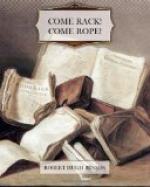“That is what I have come for,” said Marjorie. “We have Mrs. Thomas over at Babington House.”
“She’ll be of no great service to her husband,” said the other. “She cries and laments too much. Now—”
He stopped himself from paying his compliments. It seemed to him that this woman, with her fearless, resolute face, would do very well without them.
Then he set himself to relate the tale.
It seemed that little Mrs. Thomas had given a true enough report. It was true that Topcliffe had arrived from London on the morning of the arrest; and Mistress Manners was perfectly right in her opinion that this signified a good deal. But, it seemed to Mr. Bassett, the Council had made a great mistake in striking at the FitzHerberts. The quarry was too strong, he said, for such birds as the Government used—too strong and too many. For, first, no FitzHerbert had ever yet yielded in his allegiance either to the Church or to the Queen’s Grace; and it was not likely that Mr. Thomas would begin: and, next, if one yielded (suadente diabolo, and Deus avertat!) a dozen more would spring up. But the position was serious for all that, said Mr. Bassett (and Mr. Biddell nodded assent), for who would deal with the estates and make suitable arrangements if the heir, who already largely controlled them, were laid by the heels? But that the largeness of the undertaking was recognised by the Council, was plain enough, in that no less a man than Topcliffe (Mr. Bassett spat on the floor as he named him), Topcliffe, “the devil possessed by worse devils,” was sent down to take charge of the matter.
Marjorie listened carefully.
“You have no fear for yourself, sir?” she asked presently, as the man sat back in his chair.
Mr. Bassett smiled broadly, showing his strong white teeth between the iron-grey hair that fringed his lips.
“No; I have no fear,” he said. “I have a score of my men quartered in the town.”
“And the trial? When will that—”
“The trial! Why, I shall praise God if the trial falls this year. They will harry him before magistrates, no doubt; and they will squeeze him in private. But the trial!... Why, they have not a word of treason against him; and that is what they are after, no doubt.”
“Treason?”
“Why, surely. That is what they seek to fasten upon us all. It would not sound well that Christian should shed Christian’s blood for Christianity; but that her Grace should sorrowfully arraign her subjects whom she loves and cossets so much, for treason—Why, that is as sound a cause as any in the law-books!”
He smiled in a manner that was almost a snarl, and his eyes grew narrow with ironic merriment.
“And Mr. Thomas—” began Marjorie hesitatingly.
He whisked his glance on her like lightning.
“Mr. Thomas will laugh at them all,” he cried. “He is as staunch as any of his blood. I know he has been careful of late; but, then, you must remember how all the estates hang on him. But when he has his back to the wall—or on the rack for that matter—he will be as stiff as iron. They will have their work to bend him by a hair’s breadth.”




